Iran To Change Content Of English Textbooks Upon Khamenei’s Order
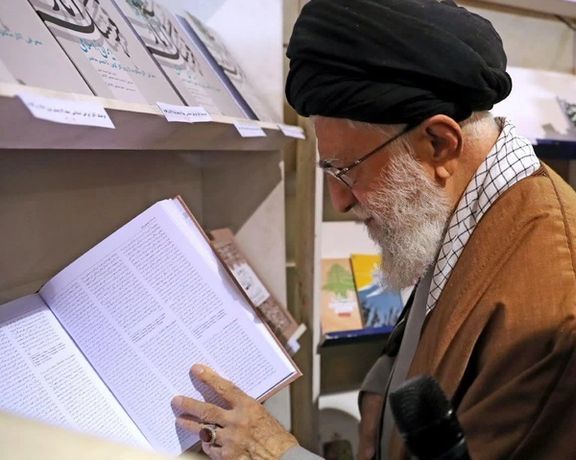
The Islamic Republic has announced its intention to change the content of textbooks in foreign language schools after criticism by Iran’s ruler Ali Khamenei.

The Islamic Republic has announced its intention to change the content of textbooks in foreign language schools after criticism by Iran’s ruler Ali Khamenei.
Head of Non-Governmental Schools and Centers Ahmad Mahmoudzadeh told ILNA Sunday that “We will have a call to produce content of language books for schools, which will be implemented in line with the order of the Supreme Leader.”
"Language books that have nothing to do with our culture will be discarded," he added.
Changing the content of textbooks based on the government's propaganda policies has been implemented in the last few years upon the order of Supreme Leader Ali Khamenei. However, this is the first time that these changes will be applied to the language teaching books of private institutes.
Ali Khamenei had earlier criticized teaching English in general, saying in 2016 that "now we have reached to a point that English language learning has been extended to kindergartens".
Following his comments, ministry of education put a ban on teaching English at primary schools.
English is not included in Iran's official curriculum during the six years of primary school, but various non-governmental and a small part of public schools teach students English as extra-curricular subject, and these classes are not mandatory.
In recent years, some government officials have also suggested that instead of English, the teaching of Russian, Chinese and German languages should be supported in Iran.
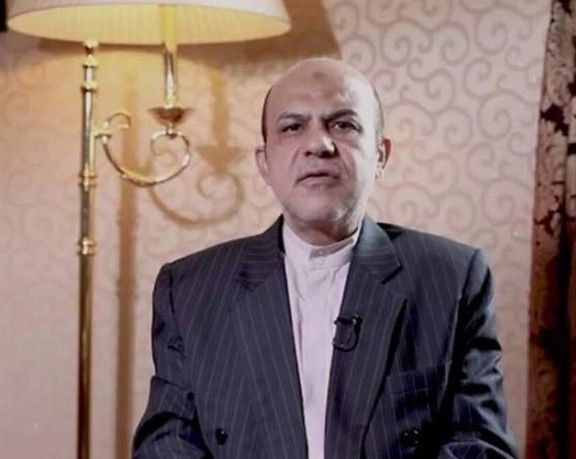
Iran's Minister of Tourism and Cultural Heritage, Ezzatollah Zarghami has expressed concern over the execution of British-Iranian national Alireza Akbari.
Akbari, a former high-ranking defense official was accused by the regime of espionage for the United Kingdom.
Zarghami in a tweet on Saturday called for an investigation into Akbari's "change of behavior", saying that "I am worried about the repetition of this process." He did not say that he believes Akbari was innocent, something that would endanger his own security.
He added that "Alireza Akbari's fate was a bitter experience for the establishment" because he had "70 months of service" in the Iran-Iraq war.
Iran announced Akbari’s execution on Saturday, after sentencing the former Iranian deputy defense minister to death for espionage.
Akbari, also served as an advisor to the Secretary of Iran's Supreme National Security Council (SNSC) Ali Shamkhani.
A source close to the Islamic Revolutionary Guard Corps has provided information to Iran International showing that accusations against Akbari and his death sentence were aimed at weakening Shamkhani’s position in the clerical regime. It seems that President Ebrahim Raisi, Intelligence Minister Esmail Khatib and Interior Minister Ahmad Vahidi are exerting pressure to remove Shamkhani from the post.
The execution of Akbari was met with a wave of international condemnations, and Britain sanctioned Iran's Prosecutor General Mohammad Jafar Montazeri hours after Akbari’s execution was announced.
Britain called the execution a barbaric act, a sentiment echoed by the United States, France, Germany and Canada.

Iran's government has allocated 75 trillion rials or almost $200 million in its proposed annual budget for the state broadcaster IRIB, its main propaganda outfit.
The IRIB's budget for the Iranian year 1402 which starts on March 21, has grown by 42 percent compared to last year's budget.
Some observers have attributed the rise in the state TV's budget to IRIB Chief Payman Jebelli's development plans for the organization. But the 7-fold rise in IRIB's annual budget since 2018 or its 4-fold increase since the inauguration of President Ebrahim Raisi in 2021 can be explained as a way of helping the state television to cope with the sharp devaluation of Iranian currency.
The Raisi administration started with a rate of exchange for US dollar of 250,000 rials which has so far risen to around 400,000 rials.
Last year, the state TV's budget was larger than the budgets allocated of 16 government ministries. This year, it is more than the budget for any Iranian province other than the Fars Province. Nonetheless, according to many critics and media including Khabar Online its audience has been declining since 2017.
While the budgets of the education ministry or other essential institutions have in real terms declined because of the worthless rials they receive, the hardliners ruling in Iran have made sure their main propaganda and repression outfits are well compensated for the de facto devaluation of the national currency.
Despite this, IRIB's output has been decreasing. Some of the TV series made on hefty budgets has had only 16 percent popularity according to the IRIB's own research center. Meanwhile, the broadcaster had to pull several entertainment programs that TV host Reza Dorostkar called "rubbish".
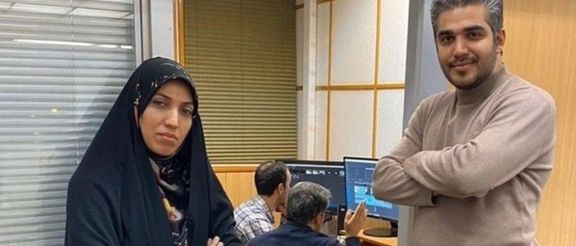
But for the regime perhaps the more important thing is that IRIB broadcasts confessions of dissidents obtained under torture. Two of its so-called journalists are active interrogators of political prisoners.
The 42-percent rise in IRIB's budget becomes meaningful when we consider a minimal 20-percent salary increase for government employees in the face of an at least 50-percent inflation rate. An example of the extravagant rise in IRIB's budget is the amount allocated to the broadcaster's supervisory board which has only 6 members, all regime insiders. The budget for the supervisory board has increased from 70 billion rials two years ago to 90 billion rials last year and 145 billion rials for the coming Iranian year on March 21.
Nonetheless, the state TV is not the only organization receiving a hefty annual budget for the coming year. There are tens of religious and ideological propaganda organizations that are not accountable to anyone and have no checks and balances for their financial turnover.
According to economic journalists in Iran, The budget for Propaganda Office of the Qom Seminary has increased by 54.4 percent, The organization that runs Ruhollah Khomeini's tomb has received a 71.4 percent rise, the organizations that protects the relics of the 1980s war with Iraq received a 159.2 percent boost and the office of Supreme Leader Ali Khamenei's representatives at the universities rose by over 40 percent.
Reports also say that among Iranian security organizations, the Intelligence Ministry got a 43 percent rise while the the police force got is 41 percent, the Army's Joint Chief of Staff got 32.5 percent, the IRGC 48 percent and the Basij 11.5 percent.
The substantially enlarged draft state budget, which is heavily dependent on tax revenues, will kickstart a month-long review of the bill before parliament holds a vote to approve it and turn it into a law. Last year the Majles changed some of the figures presented by the government in budget bill, but the parliament complained later that the Raisi administration spent the budget in its own way rather than sticking to the what the Majles had approved.
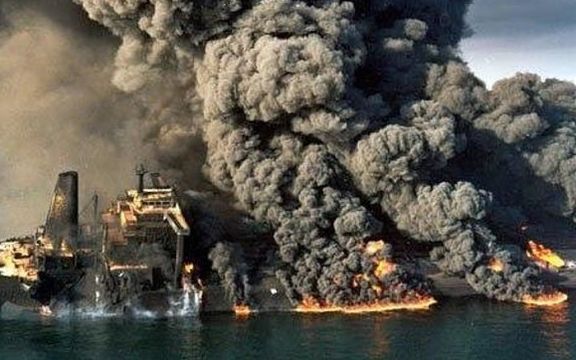
Two years after launching a case in Washington, law firm Herischi & Associates have announced a complaint in the British Maritime Court over the Sanchi tanker disaster.
Herischi & Associates, who are based in Bethesda, Maryland, say they have taken a case in the United Kingdom against the National Iranian Tanker Company (NITC), and against insurers for NITC and the Sanchi. The Panamanian-flagged, Iranian-owned tanker caught fire in January 2018 after colliding in the East China Sea, 530km south east of Shanghai, with a Hong-Kong registered Chinese cargo ship, the CF Crystal.
While the 21-strong Chinese crew were rescued, Iran announced that all 30 crew members on the Sanchi – 30 Iranians and two Bangladeshis - had died due to explosions, fire, and release of noxious gases resulting from a volatile 136,000-tonne cargo of natural-gas condensate.
But in a press release to publicize its latest case, Herischi & Associates claimed that the crewmen successfully left the ship, that the Sanchi was carrying a “secret cargo to be delivered secretly to North Korea,” and that 22 crew were alive in Iranian custody “weeks after the accident.” The press release gave no indication of what the secret cargo was.
Letter from Kim Jun Un
The law firm said it had discovered all this through gaining access to emails and recordings of Iranian officials, “volunteered sensitive information” from Iranian security forces, as well as “top secret Iranian documents” including a message from Revolutionary Guards intelligence to Iran’s Supreme Leader Ali Khamenei. Herischi & Associates even claimed to have a letter from North Korean leader Kim Jung Un to Iranian supreme leader Ali Khamenei “thanking him for delivery of the cargo and his sadness [sic] for the accident.”
Iran at the time announced that the Sanchi was sailing from Asaluyeh, Bushehr province, southern Iran, to South Korea. Nader Pasandeh, a senior official at Iran’s Ports and Maritime Organization, told reporters that the Crystal had caused the collision through human error.
But in early 2019, Iranian media carried reports of family members protesting outside the foreign ministry, the Chinese embassy and the presidential office. Relatives told Shargh, Hamshahri and other newspapers that they had received telephone calls, broken off as soon as answered, from sailor relatives who had been on the Sanchi. Mohammad Mehdi Boroumandi, who chaired a government committee into the disaster, said claims “about the Sanchi crew being taken hostage” were “based on hearsay,” while parliament member Mohammad Reza Kouchi called for an investigation into hoax calls.
‘Undisclosed location’
In December 2019, Herischi filed a lawsuit in a district court in Washington DC against the ‘National Iranian Tanker Company’ and named officials on behalf of families of ten crewmembers of the Sanchi. According to the law firm’s press release at that time, the families alleged “the crew of the Sanchi were seized after the collision” and had “been held in detention for nearly two years in an undisclosed location.” Herischi cited “the key piece of evidence” as “multiple phone calls…made from crewmembers’ cellphones to their relatives in the months following the ship’s destruction.”
In October 2020, Herischi announced thy were seeking over $1 billion damages for US citizens who lost relatives when a Ukrainian passenger airliner bound for Kyiv was January 2020 shot down over Tehran by a mobile missile launcher during high tensions with the US.
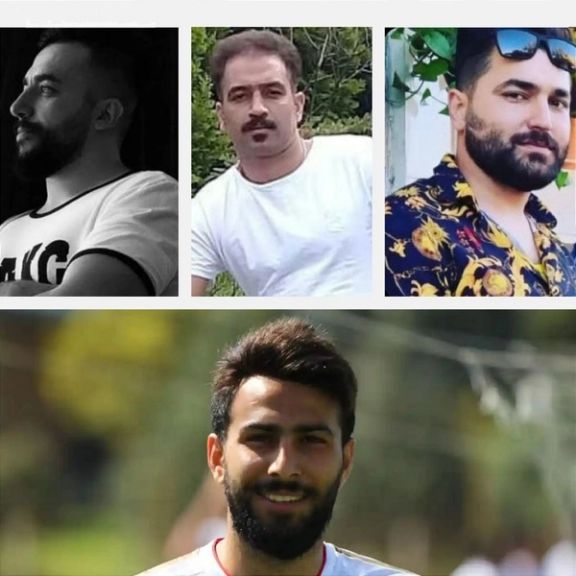
Concerns are growing over the possible execution of three more detained Iranian protesters, as reports say they have been transferred to solitary confinement.
Majid Kazemi and Saeed Yaqoubi arrested in Esfahan are reportedly taken to solitary confinement which is suggesting that they would be hanged soon.
Colleagues and family members of Majid Kazemi, who is sentenced to death have made a video appeal Saturday, demanding the release of the young protester.
In an audio file from prison on Friday, Majid Kazemi said he was forced to make false confessions under duress.
Saeed Yaqoubi and Saleh Mirhashmi are two other defendants in the case known as “Esfahan House” who have received the death penalty along with Majid Kazemi.
Saleh Mirhashmi said earlier that he has been tortured in detention and the agents have injured his ears and broken his teeth while beating him.
At the same time, Amir Nasr-Azadani, who used to play for several Iranian football teams, has released an audio file asking the sports community to support him.
Nasr-Azadani is another defendant in the case who earlier received a 26-year jail term. In his audio file, the former football player asked athletes and his friends to be his voice and support him.
The Islamic Republic accused several people in connection with an armed attack on November 16 on “Esfahan House” neighborhood claiming that two security forces and a police officer were killed by protesters.
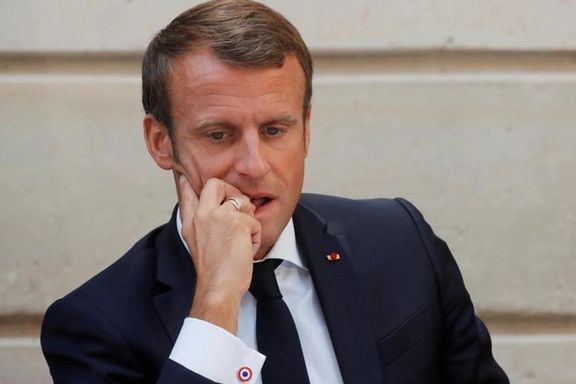
The execution of British-Iranian dual national Alireza Akbari is a heinous and barbaric act, French President Emmanuel Macron said on Saturday.
Macron said he stood in solidarity with Britain which has condemned the execution, which defied British and US calls for the 61-year-old Akbari's release after he was handed a death sentence on charges of spying for Britain.
“His name is added to the too long list of victims of repression and the death penalty in Iran. Solidarity with the United Kingdom. Solidarity with the Iranian people,” Macron said.
Macron’s statement came after both the British prime minister and foreign secretary harshly condemned Tehran’s act.
"I am appalled by the execution of British-Iranian citizen Alireza Akbari in Iran," British Prime Minister Rishi Sunak said on Twitter. "This was a callous and cowardly act, carried out by a barbaric regime with no respect for the human rights of their own people."
British Foreign Secretary James Cleverly also tweeted to say: "This barbaric act deserves condemnation in the strongest possible terms. This will not stand unchallenged."
In an audio recording from Akbari and broadcast by BBC Persian and Iran International, he said he had confessed to crimes he had not committed after long interrogation and extensive torture.
"After more than 3,500 hours of torture, psychedelic drugs, and physiological and psychological pressure, they took away my will. They drove me to the brink of madness. They instilled in me what they wanted and forced me to make false confessions at gunpoint and threats of death," Akbari said.